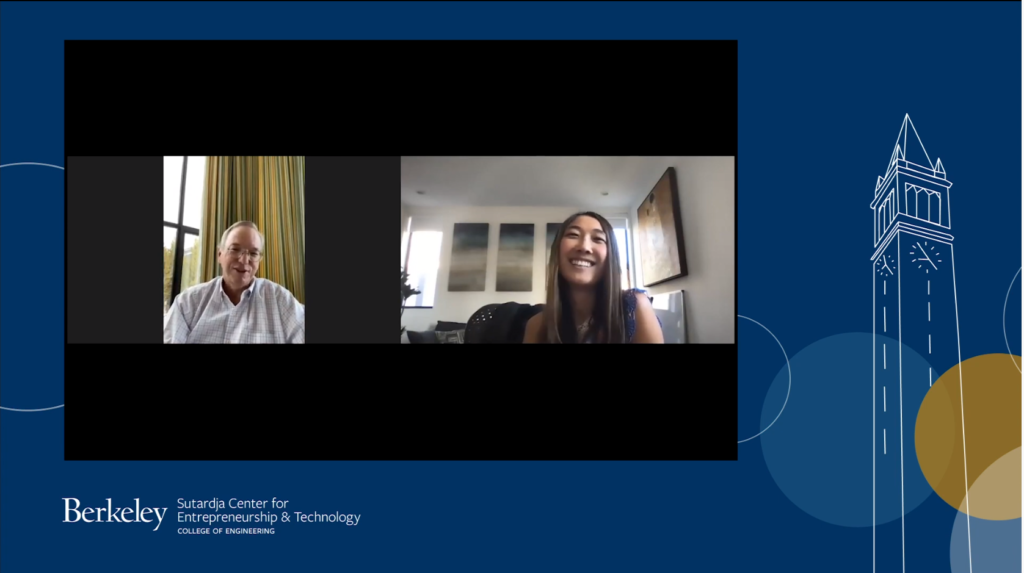
Dr. Schmidt discusses being tested as a CEO, near misses, why everyone needs a coach, and the most important leadership skill
The Sutardja Center for Entrepreneurship & Technology was honored to welcome Dr. Eric Schmidt (PhD 1982, Computer Science) in conversation with Jessica Mah (BS 2010, Computer Science) to the A. Richard Newton Lecture Series: A Berkeley Changemaker Course (INDENG 95/195/296) on March 16. 2021. Dr. Schmidt was introduced by Dean Tsu-Jae King Liu, and is the co-founder of Schmidt Futures and Former CEO of Google. As Google’s CEO and Chairman from 2001 to 2011, he pioneered the company’s transformation from a Silicon Valley startup to a global leader in technology. Jessica Mah was introduced by Amrita Bhasin, and is the founder and CEO of inDinero. This is the third time that Jessica has been a part of the Newton Series and visited previously in 2015 and 2017.
As a technologist and business leader herself, Jessica first asked Eric to talk about his journey from studying computer science to becoming a CEO and leader of some of the world’s most successful companies. Eric enjoyed his time as a PhD student in Berkeley, spending most of it living at International House and working on the 5th floor of Cory Hall. While he spent some time distracted playing Colossal Cave Adventure, (the password is “Xyzzy”), being a student at Berkeley was an incredibly fruitful experience for Eric. It was at Berkeley where he met Bill Joy, who hired him to work with him on a lexical analyzer in the lab of EECS Professor Sue Graham. He and Bill formed a strong connection, and he would chat on the phone with Bill most nights about computer science and the future of the industry. Bill went on to co-found Sun Microsystems, and hired Eric to join him.
While Eric did not have much leadership experience at the time, “the reason to do startups is that there is an awful lot to do and no one to prevent you from doing it,” so Eric asked Bill if he could be a manager, knowing he could learn a lot by being thrown into it. In this leadership role, he worked on how to make people more productive, keep programmers programming, and learned that ultimately it was his job to be a service to his employees.

So, should every college student join a startup after graduating or pursue a sure thing like working at a large, established company? While joining Sun Microsystems, the creator of the Java programming language, which is still one of the most used programming languages today, might seem like a surefire bet in hindsight, in the early 1980s there was not an expectation that computer science would take over a large part of the world’s economy, and this was inherently a riskier prospect than it might seem like today. But Eric knew that he was passionate about computer science, that Bill Joy was brilliant and he liked working with him, and ultimately that he had a fallback plan to become an engineering manager if it didn’t work out.
“As a young person, you can take far more risks than you can take 10 years from now. I always think you should take the riskiest thing in front of you that you think you can succeed in,” said Eric.
After being Sun’s first software manager, director of software engineering, vice president and general manager of products division, and then Sun Microsystems President, Eric wanted to do something different and accepted a role as CEO & Chairman at Novell, a software networking company. Eric found Novell was in worse shape than expected with respect to revenue, customer adoption and other indicators. While he found the role very challenging, he was grateful for the experience.
“Those years, which were very difficult, were crucial to my development as an executive because I developed an ability to lead. Whereas when you are working in a large organization that is well run, you accept the dogma; you accept the rules. But when you are plunked into a new environment and you really have to deal with it, you find out what you are made of.”
Eric then recounted a story where shortly after he was hired, a Novell executive told him the revenue was much less than he was led to believe, and encouraged him to creatively misrepresent earnings. Instead, Eric decided he’d rather communicate the truth about the state of the company to the public, which led to the stock falling. For Eric, this was the test, where one can only know what they will do when a decision like this is in front of them. He was very disturbed by the whole thing and reverted Novell back to a traditional accounting system to be even more transparent.
“So, when I showed up at Google, we were on a mission to do things right. Where did that strength come from? It came through the test. What I learned as a leader is that real leaders are tested in real time and the sum of those decisions becomes your legacy.”
So, why didn’t Eric just quit Novell when he found out things weren’t what he expected? Well, he wanted to honor the commitment he made, and he liked the people who worked there. But in addition, he knew that the fundamental job of being a leader is to step up when things don’t go as planned.
“You want to hire the CEO that doubles-down, works even harder, motivates the troops against the competitor, and wins against the new challenge,” said Eric about how the best leaders react under adversity. “And that skill is the hardest skill to test for, but it’s the most important leadership skill. If you believe it, your employees will believe it. If you don’t believe it, your employees will figure it out.”
Being tested at Novell prepared Eric for a new challenge. In 2000, he received a call from venture capitalist John Doerr, encouraging him to take a meeting with Google who was looking for a new CEO. At the time, Eric thought Google was “just a search engine that wouldn’t amount to much,” but John encouraged him to talk to the founders anyway, and Eric agreed.
In December 2000, he scheduled a meeting with Google founders Larry Page and Sergey Brin. Arriving at the office was surreal as at the time Google was in the same office space that Sun Microsystems was in when Eric worked there, though now with different furniture. Eric described the meeting with Sergey and Larry as a “rough interview” as they were aggressively questioning him. Despite this, Eric found himself pleased as he exited the office building and thought that he hadn’t had that good of an argument in years.
At the time Google’s founders were required by their investors to hire a professional CEO — “adult supervision” as it is sometimes called in the Valley — and Eric believes that ultimately they chose him because they had some shared background with similar professors in the past, because they liked his plan for the future, and because they knew that they did need him, and he would respect what they had created.
He remembered Larry saying, “You know, we don’t need you now, but we are going to need you in the future.”
Larry and Sergey were doing very well at running Google, the company, but they knew they needed Eric to build Google, the corporation. Eric has deep respect for founders and recalled the story of Steve Jobs and John Sculley, Jobs being the innovative founder who famously butted heads with Sculley who was a professional CEO that pushed Jobs out of Apple, before Jobs found a way to rejoin later when Apple acquired NeXT Computer, Inc. Eric knew he needed to let the founders do what they wanted, and he would do the rest.
“My strategy with the company was to let them do whatever makes sense to them, because they are so smart, as long as we put some guard rails on it,” said Eric.
Eric was CEO of Google from 2001 until 2011, guiding the company from fewer than 300 employees to more than 30,000, which wasn’t without its challenges. Despite the astronomical growth, there was a time when the Google Board of Directors voted to remove him as Chairman, but keep him in the CEO role. This made Eric very frustrated, as Google was doing extremely well, but it was during this time that Eric learned the importance of mentorship, specifically his own mentor, Bill Campbell.
“I called Bill, and he immediately came to my office and listened to me. I told him I was going to resign — which would have been the largest career error ever made in history — because my feelings were hurt. This was my immaturity now. Bill looks at me and says ‘I understand this is a process that only modestly involves you… just let it happen.’ And I had such trust in my advisor, Bill, that he coached me off the ledge, and I accepted it. If you look very carefully at the history of the company, you will see that I was chairman, then I was not chairman, then I was made chairman again as Bill projected,” said Eric. “I tell you this, because that was an example of a near miss, where I could have made a horrific emotional mistake.”
For Eric, mentors are critical: everyone can be a mentor, and everyone needs a mentor, and that the key quality of a good coach is caring about their mentees. Eric was so affected by his mentor, Bill Campbell, that he wrote Trillion Dollar Coach: The Leadership Playbook of Silicon Valley’s Bill Campbell in 2019 to share the wisdom he received from Bill with the world.
“Try to get people to perform at their highest level, and do it because you care about them,” Eric had learned from Bill Campbell who clearly loved his mentees. Eric thinks that relationships matter greatly for successful leaders and that if he could go back and give advice to his younger self, he would tell him to do a better job of cultivating relationships, because ultimately they can save you from making mistakes. No matter how smart or capable you are, everyone needs loyal friends and help sometimes.
“A coach is not someone who tells you to swim faster, a coach is someone who gets you to perform better,” said Eric.
Eric became the executive chairman of Google’s parent company, Alphabet, in 2011, and then became a technical advisor for Google in 2017 before finally stepping down from the company in 2020. In 2017, he co-founded Schmidt Futures, a philanthropic initiative that bets early on exceptional people making the world better. Eric’s focus now is helping America become more competitive in the technologies that he believes are going to guide the future, such as artificial intelligence, software, AI, quantum computing, 5G, robotics, energy, and others.
“So, I thought what I should do for the next while is try to get American policy, and American technology, and American science focused around building the great platforms of the future in all those areas,” said Eric.
